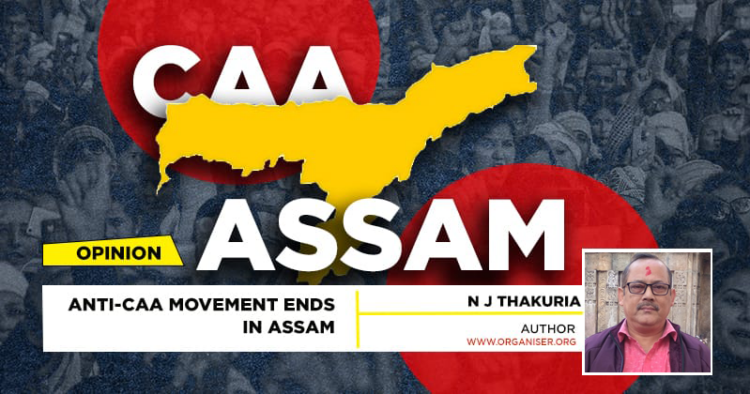Even though many biased elements of Assam tried to put the State in volatile situation, they failed this time to mobilise the common people with the sentiment of Assamese nationalism, as it was observed five years back, when the Citizenship Amendment Bill (CAB) was presented in the Parliament. Just before the corona lockdown across the country, Assam witnessed a massive public outcry opposing the CAB in the Brahmaputra valley.
Anti-national elements grabbed the opportunity to indulge in outspread violent activities in Guwahati following which the curfew was clamped. Even five people from the city fell victim to circumstance as the police had to resort to firing to bring the law & order situation under control.
It may be mentioned that soon after the Union home ministry’s 11 March notification of the Citizenship Amendment Act (CAA) 2019, many individuals and organisations in Assam pronounced uproarious statements against the CAA rules and urged the people to come to the streets demanding its immediate repeal.
Some have already approached the Supreme Court of India to nullify the act claiming that it’s unconstitutional. At least three State governments namely West Bengal, Tamil Nadu and Kerala have raised strong opposition voices against the implementation of CAA. Many of the petitioners challenged the Citizenship (Amendment) Rules, 2024 in the Supreme Court with the argument that Muslim refugees should not be ignored.
The argument against the CAA in Assam has a different perspective where most of the agitators maintained that Assam Accord must not be challenged by the new guidelines. The accord, signed after six years long historic agitation to identify and deport illegal migrants (read East Pakistani and Bangladeshi nationals) from Assam reached a date of 21 March 1971, after which nobody should be offered citizenship in Assam.
All Assam Students Union (Aasu), which was the prime party to sign the Assam Accord (1985) in presence of the then Prime Minister Rajiv Gandhi, launched a series of protest demonstrations against the CAA implementation.
Aasu along with 30 indigenous organisations burnt copies of the CAA during the protest rallies in Guwahati, Nalbari, Barpeta, Golaghat, Tezpur, Lakhimpur, Dibrugarh, etc. However, their programs could not motivate the common Assamese even in the Brahmaputra valley (not to speak of Barak valley). Facing the heat on ground, the Aasu leaders moved to New Delhi and approached the SC to repeal the CAA.
The petitioners are supported by the opposition political party leaders, where they argued that the CAA was only a political tool for the ruling Bharatiya Janata Party to win Lok Sabha polls in Bengal, Assam and Tripura.
Meanwhile, popular Assamese singer Zubeen Garg, who was a star attraction in the anti-CAB movement, has faced criticism from his fellow musicians. Recently Garg took to his social media space to reiterate firm opposition to the CAA rules. He pledged to raise voices against the particular act according to his ways.
Probably he could understand the mood of people and hence cleverly commented that no more deaths should be accepted because of any agitation. Garg did not forget to mention that in the 2019 anti-CAA agitation, five youths had to die. Now his critics asked Garg to clarify his actual position on the CAA.
Amidst the developments, a forum of nationalist citizens, came out with a statement where it appreciated the mainstream Assamese society for taking rational views on the CAA despite ‘provocative statements from some so-called intellectuals, journalists, and political analysts’.
However, the Patriotic People’s Front Assam (PPFA) urged both the governments in New Delhi and Dispur to convince the people that the CAA deadline of December 31, 2014 will not be extended anymore. The forum also urged the Union government to strongly pursue with the governments of
Muslim-majority Bangladesh, Pakistan and Afghanistan to stop indulging in religious persecution against the minorities (Hindus, Sikhs, Buddhists, Jains, Parsis, Christians, etc).




















Comments